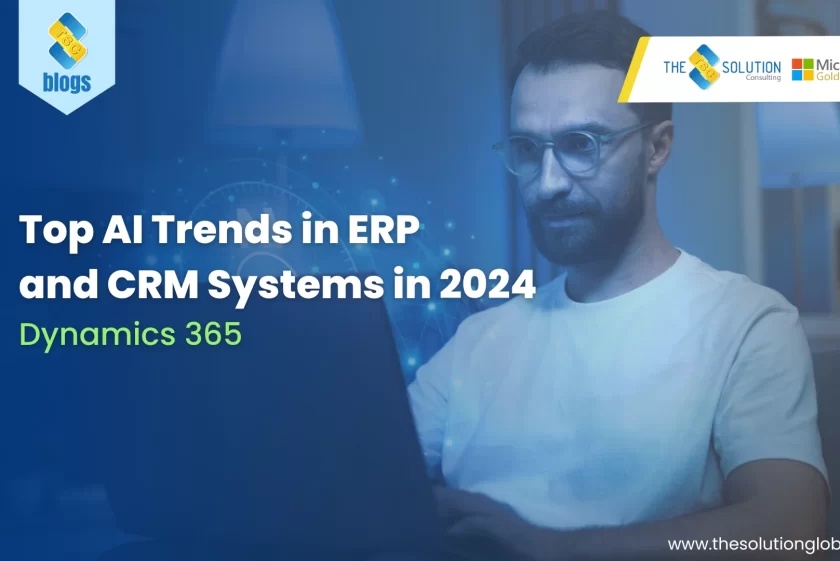
Top AI Trends in ERP and CRM Systems to Watch for in 2024
The tides are turning in business innovation, and organizations are seeking practical solutions through technology for rapid value creation. This is where modern and advanced Enterprise Resource Planning (ERP) and Customer Relationship Management (CRM) systems powered by Artificial Intelligence (AI) like Microsoft’s Dynamics 365 gain the spotlight. These solutions integrate generative AI, automation, and other advanced AI features into everyday tools, empowering employees and personalizing customer experiences.
Why Embrace AI-powered CRM and ERP in 2024?
By adopting AI-powered CRM and ERP systems, businesses can unlock a new level of transformation, innovation, and efficiency in three key areas:
- Streamlined Operations: Break down data silos and unify CRM and ERP systems into a collaborative, automated ecosystem for seamless teamwork and information sharing.
- Data-Driven Decisions: Equip all employees with AI-powered natural language processing tools for faster insights generation, enabling informed decision-making and market opportunity identification.
- Elevated Customer and Employee Experiences: Personalize customer interactions with 360-degree customer profiles. Additionally, leverage AI-powered chatbots and automated workflows to free up employee time for more strategic tasks, boosting overall productivity.
- Predictive Analytics and Forecasting: AI embedded in ERP and CRM systems can process and analyze vast amounts of data to uncover hidden trends and patterns. This allows businesses to effectively predict customer behaviour and future purchases and forecast future demand for products and services with greater accuracy, allowing for optimized inventory management and resource allocation.
Looking Ahead: Top AI Trends for CRM and ERP in 2024
The future holds immense potential for innovative uses of CRM and ERP AI. Here are some key trends to watch for in 2024:
- Democratizing AI with Data-Driven Strategies: User-friendly interfaces with AI co-pilot functionalities and customizable dashboards with data visualizations will empower employees across departments to access and interpret AI-generated insights for smarter decisions.
- Hyper-Personalization: Predictive sales and marketing will reach new heights with AI’s aid in forecasting customer behavior, preferences, and journey mapping. This allows marketers to craft more creative campaigns and empowers sales teams for better customer engagement. AI-powered CRM platforms will also leverage social media and other data sources to provide deeper customer insights and brand perception analysis.
- Cloud-powered Efficiency: The synergy between AI-powered CRM and ERP tools with scalable, flexible cloud platforms designed for massive data storage will unlock a new era of efficiency. Businesses will discover and deploy new automation use cases quickly within the cloud environment, further boosting workforce productivity and process accuracy.
- Integration with the Internet of Things (IoT): The convergence of AI and IoT holds immense potential for CRM and ERP systems. AI can analyze data collected from IoT devices (e.g., connected products) to gain real-time customer usage patterns and preferences, enabling proactive customer service and personalized product recommendations. AI can analyze sensor data from equipment to predict maintenance needs, preventing costly downtime and optimizing maintenance schedules. Real-time data from connected devices within the supply chain can be used by AI to optimize inventory levels, predict potential disruptions, and improve overall supply chain efficiency.
- Ethical AI at the Forefront: Responsible innovation demands adherence to ethical AI principles, potentially necessitating adjustments to business processes and growth strategies. Microsoft champions responsible AI practices and actively contributes to AI policy, research, and engineering to guide ethical development and implementation.
Best Practices for AI Adoption in 2024
To maximize the transformative potential of AI in CRM and ERP systems, a well-defined, adaptable strategy is essential. Here are key steps to consider for successful AI adoption in 2024:
- Long-Term Vision: Create a strategic roadmap for AI implementation that prioritizes both employee empowerment and business process optimization. Foster a data-driven culture within your organization and equip your workforce with the relevant AI skills they need to thrive. Additionally, seamlessly integrate user-friendly, scalable AI tools into your CRM and ERP systems for a smooth transition.
- Data is Key: High-quality data is the cornerstone of reliable AI. Implement rigorous data security and integrity standards. Regularly audit AI training data to identify and eliminate potential pitfalls, ensuring the trustworthiness and ethical implementation of your AI systems.
- Alignment with Business Goals: Ensure all AI initiatives align tightly with your organization’s overall strategic objectives. Actively measure the impact of AI on key business outcomes and proactively manage any potential negative effects on stakeholders.
The Power of AI in Business Transformation
The future of CRM and ERP systems is undeniably intertwined with the ever-evolving power of AI. By embracing these trends, businesses can unlock a new era of intelligent automation, data-driven decision making, and personalized experiences. As a leader in the field, Microsoft Dynamics 365 is continuously evolving to harness the potential of AI. Its user-friendly interface and commitment to responsible AI development empower employees across all departments to leverage AI-generated insights for smarter decision-making. Dynamics 365 seamlessly integrates advanced AI features like predictive analytics, automated workflows, and real-time data analysis to streamline operations, optimize processes, and empower your workforce. By staying at the forefront of AI integration, Microsoft Dynamics 365 positions your organization for a future of intelligent business transformation.


